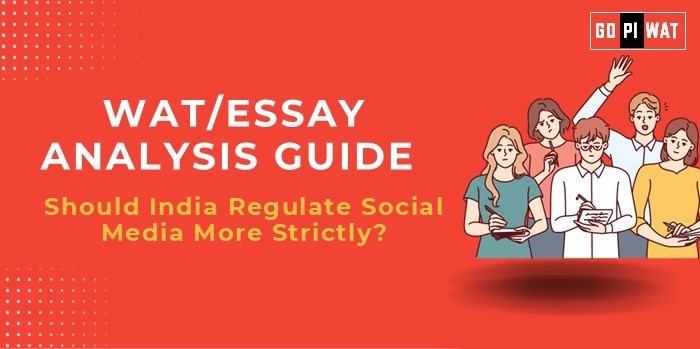📋 Written Ability Test (WAT)/Essay Analysis Guide: Should India Regulate Social Media More Strictly?
🌐 Understanding the Topic’s Importance
The regulation of social media in India is pivotal, impacting freedom of expression, national security, and the digital economy. Striking the right balance is essential for sustaining democratic values while ensuring societal safety.
📝 Effective Planning and Writing
- ⏳ Time Allocation:
- Planning: 5 minutes.
- Writing: 20 minutes.
- Review: 5 minutes.
- 📚 Preparation Tips:
- Familiarize yourself with current regulations like the IT Rules 2021.
- Gather data on social media usage and its impacts.
- Understand global regulatory frameworks for comparative analysis.
✨ Introduction Techniques for Essays
1. Contrast Approach
“While social media platforms have democratized information dissemination, the surge in misinformation and hate speech calls for a reevaluation of regulatory frameworks.”
2. Timeline Approach
“Since the implementation of the IT Rules in 2021, India has made strides in regulating social media. However, the challenges of misinformation, data breaches, and hate speech have intensified, necessitating further scrutiny of existing frameworks.”
🏗️ Structuring the Essay Body
1. Achievements
- ✅ Enhanced Accountability: IT Rules 2021 mandated grievance redressal mechanisms, improving response times and transparency.
- 🤖 Content Moderation Advances: Platforms introduced AI-driven moderation and partnered with fact-checkers to limit misinformation.
- 🌍 Global Comparisons: India’s steps toward regulating digital spaces echo the EU’s Digital Services Act, aiming for a balance between user safety and free speech.
2. Challenges
- ⚖️ Ambiguities in Law: Provisions in the IT Rules remain unclear, leaving room for potential misuse or overreach.
- 🛠️ Enforcement Issues: Resource constraints hinder the consistent application of regulations, particularly across smaller platforms.
- 📉 Case Study Example: The AIIMS ransomware attack in 2022 showcased vulnerabilities in digital infrastructure, raising questions about preparedness.
3. Future Outlook
- 💡 Proactive Policy Frameworks: Suggestions include integrating AI for moderation, increasing user education, and ensuring multi-stakeholder consultations.
- 🤝 Global Collaboration: India could adopt best practices from countries like Estonia, a leader in digital governance, to refine its strategies.
📄 Concluding Effectively
- ⚖️ Balanced Perspective Template: “While stricter social media regulations are necessary to curb misuse and protect users, they must be carefully implemented to avoid stifling freedom of expression and innovation. Striking this balance will define India’s digital governance success.”
- 🌏 Future-Focused Template: “India’s regulation of social media is at a crossroads. Moving forward, transparent policies, stakeholder collaboration, and global alignment will be key to ensuring a secure and democratic digital space.”
🔎 Analyzing Successes and Shortcomings
✅ Achievements
- 💻 Improved accountability through grievance mechanisms.
- 📈 Growing awareness of digital literacy.
- 🛡️ Progress in curbing misinformation.
⚠️ Challenges
- 📜 Persistent ambiguities in legal provisions.
- 🛠️ Uneven enforcement across platforms.
- ❌ Risk of suppressing dissent under the guise of regulation.
🌍 Global Context
- 🇩🇪 Germany’s NetzDG law balances freedom of speech with regulation.
- 🇪🇺 The EU’s Digital Services Act emphasizes transparency and accountability.
💡 Recommendations for Sustainable Progress
- 📜 Develop clear and transparent legal frameworks to eliminate ambiguities.
- 🎓 Strengthen digital literacy campaigns to empower users.
- 🤝 Foster international partnerships to learn from global best practices.
📚 Sample Short Essays
1. Balanced Perspective
“India’s digital landscape is both a beacon of progress and a stage for challenges. Stricter social media regulation can address issues like misinformation and hate speech. However, these measures must prioritize transparency and inclusivity to protect democratic principles. Collaborative policymaking will ensure that India emerges as a global leader in ethical digital governance.”
2. Solution-Oriented
“To regulate social media effectively, India should focus on clear legal frameworks, advanced AI tools for content moderation, and robust user education initiatives. With proactive strategies, India can balance innovation and regulation, safeguarding digital spaces while fostering an environment for growth and free expression.”
3. Global Comparison
“India can draw lessons from the EU’s Digital Services Act, which emphasizes transparency and accountability, and Germany’s NetzDG law for curbing hate speech. By aligning with these global best practices, India can implement regulations that protect users without compromising the essence of its democratic values.”


